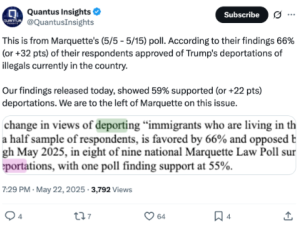Despite ongoing political and legal disputes surrounding immigration policy, recent polling indicates that a significant portion of the American public continues to support the federal government’s deportation efforts under President Donald Trump’s administration.
Two separate surveys released in May suggest that a majority of Americans maintain approval of how the administration is handling illegal immigration and deportations—one of the more controversial and central elements of President Trump’s domestic agenda.
The first poll, conducted by Marquette University between May 5 and May 15, found that 66% of respondents approved of the president’s immigration enforcement strategy. The survey was conducted in the weeks following the deportation of Kilmar Abrego Garcia, a case that drew widespread media attention and legal scrutiny due to the individual’s family ties and length of time residing in the United States. Despite the backlash, the poll results showed little erosion in public backing for enforcement policies.
Shortly after, Quantus Insights, a firm noted for its accurate polling in the 2024 election cycle, reported similar findings. Their data showed 59% support for the administration’s deportation approach, with a net positive margin of +22 percentage points.
Combined, the two surveys reflect what appears to be consistent voter support for a stricter immigration enforcement posture. These results stand in contrast to earlier claims—circulating in political commentary and some media coverage—that public opinion was shifting significantly against the administration’s efforts following a period of market instability and increased legal challenges from state attorneys general.
According to a White House fact sheet cited by USA Today, approximately 140,000 deportations had been carried out since the start of the Trump administration through April. That figure is expected to grow as enforcement continues. While initial directives focused on individuals with criminal backgrounds, the scope of operations has since expanded to include a broader range of undocumented individuals.

In a public briefing, White House immigration adviser Tom Homan stated, “The numbers are good,” referencing the administration’s metrics on deportations. Homan, formerly the Acting Director of U.S. Immigration and Customs Enforcement (ICE), has continued to play a key role in shaping immigration policy.
The federal government has leveraged multiple agencies to support its enforcement strategy. In addition to the Department of Homeland Security, coordination has included the FBI, IRS, and local law enforcement through various task forces and inter-agency agreements.
Supporters of the policy argue that enforcement is essential for national security and upholding the rule of law, while critics contend that the broadened approach may result in the removal of individuals with deep community ties or those without serious criminal records.
Debates over the scope and ethical implications of immigration enforcement are likely to remain at the forefront of national politics heading into the next election cycle. Meanwhile, the latest polling suggests that public attitudes on this issue have held steady—even amid legal battles and high-profile deportation cases.









